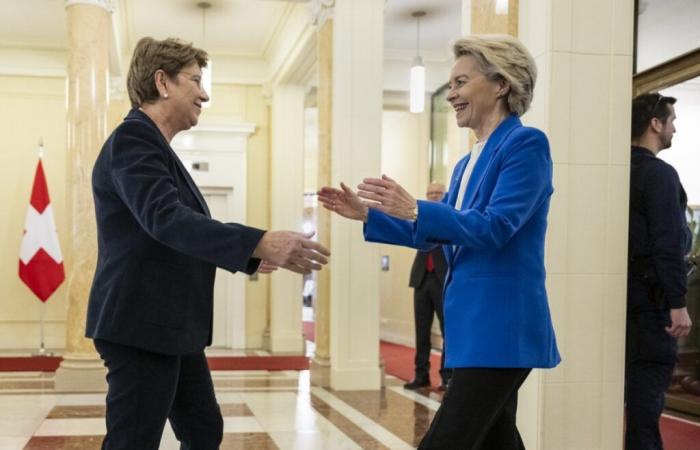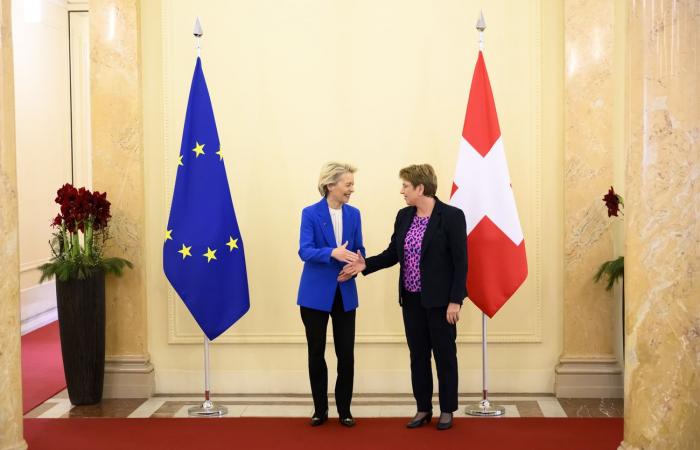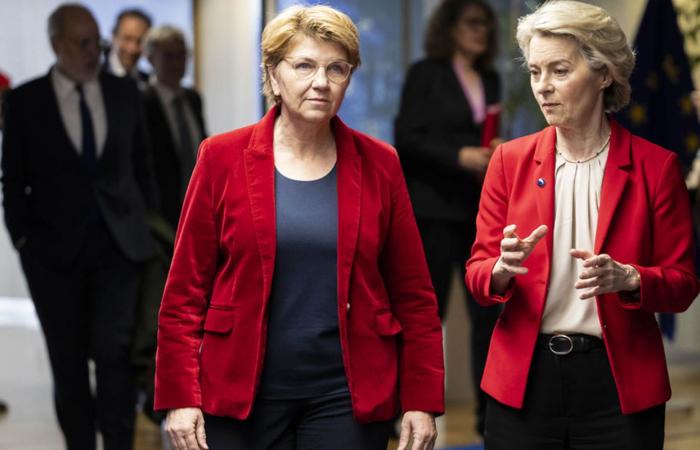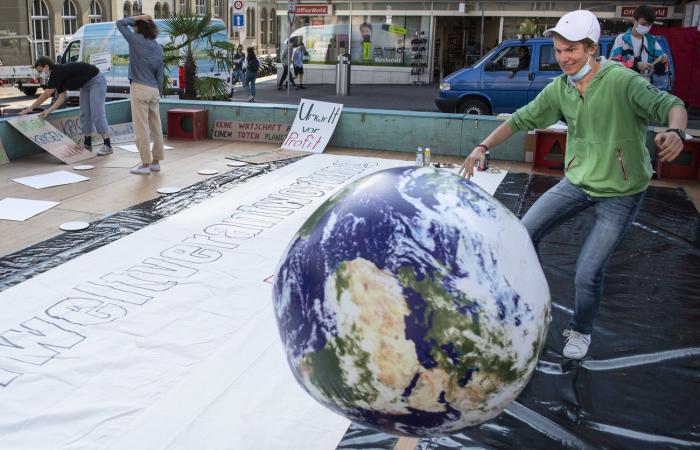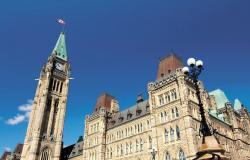Highly symbolic handshake on December 20 in Bern, between Ursula von der Leyen and Viola Amherd to mark the successful completion of negotiations between Bern and Brussels.
Keystone / Alessandro Della Valle
Relations between Switzerland and the European Union will constitute the biggest political issue of the coming year. The government will have to convince to bring about the agreement concluded with Brussels. The debates on this issue are of particular importance for the Swiss abroad.
This content was published on
December 27, 2024 – 09:10
At the heart of Switzerland’s 2025 political agenda are relations with its large European neighbor. After several months of tough negotiations, the Federal Council finally reached an agreement with the 27, the broad outlines of which it revealed before Christmas.
The President of the European Commission, Ursula von der Leyen, who traveled to Bern for the occasion, described the agreement between Switzerland and the European Union (EU) as historic. “We are giving common responses to a global reality,” she said. At his side, the President of the Confederation, Viola Amherd, spoke of “a milestone for the stabilization and development” of bilateral relations.
The government wants to consolidate the agreements aimed at stabilizing the bilateral path in a federal “stabilization” decree. This would include updating existing agreements, namely the rules on state aid, participation in EU programs and Switzerland’s contribution. The three new agreements – electricity, health, food security – will be presented separately in federal “development” orders.
>> Our article on the outcome of the agreement package between Switzerland and the EU:
Plus
Plus
Switzerland and the EU concluded their negotiations for future bilateral agreements
This content was published on
Dec 20 2024
After 197 sessions, material negotiations with the EU are completed. The President of the European Commission described the agreement as “historic”. The Swiss abroad are satisfied.
read more Switzerland and the EU concluded their negotiations for future bilateral agreements
Heated debates ahead
The successful completion of negotiations between Bern and Brussels constitutes a first step, but the work is not finished. A consultation phase should be opened before the summer. The main course to complete this file, however, is planned for 2026, when Parliament will debate the package of agreements with the EU.
The government will then have to convince the Federal Chambers and the mission will not be simple, because there is no shortage of opposition. The Democratic Union of the Center (UDC / conservative right) opposes any rapprochement with the EU. Union circles will do the same as long as they believe that wage protection is threatened.
If federal elected officials initial the agreement, it will still have to appeal to the people. According to information from several media, the Federal Council could divide the package of agreements into several pieces, which would lead to several referendums and several separate popular votes. However, the campaigns already promise to be eventful.
Plus

Plus
Switzerland remains deeply divided over relations with the EU
This content was published on
25 oct. 2024
The European question remains delicate and very controversial in Switzerland, as shown by a new survey conducted by the gfs.bern institute on behalf of the SSR.
read more Switzerland remains deeply divided over relations with the EU
Especially since the debates could already be electrified by three popular initiatives which affect relations between Bern and Brussels, even if the collection of signatures is still in progress and a possible vote on them will not take place in 2025.
Two of these texts endanger the outcome of the new treaties with the EU: the “No Switzerland for 10 million” initiative of the Democratic Union of the Center (UDC / conservative right), which clearly calls for eliminating free movement of people, and the “Boussole” initiative carried by three billionaire entrepreneurs, which wants to avoid the automatic incorporation of European law into Swiss law.
The pro-Europeans also have their initiative, that of the Operation Libero movement which demands closer ties with the EU. However, the collection of signatures for this text is struggling and could even fail.
The subject is also central for the Swiss abroad. Indeed, as the director of the Organization of the Swiss Abroad (OSE) Ariane Rustichelli notes, “bilateral agreements and their future have a direct impact on the rights of Swiss people established in Europe and on their mobility”.
>> How do relations between Switzerland and the EU influence your daily life? Take part in our debate:
Plus
Are the Swiss Abroad the forgotten ones in the European question?
What are the consequences of freezing relations for the nearly 450,000 Swiss who work, study or retire in the EU?
See the discussion
The slimming cure for federal finances
In terms of domestic policy, the government will have to carry out its large savings program, announced last September. He wants to save 3.6 billion francs from 2027, particularly in the areas of social and international cooperation. Objective: to revive federal finances strained by increased spending, particularly on the army and old age provision.
The task will be difficult for Finance Minister and President of the Confederation Karin Keller-Sutter, because these economies are causing a lot of dissatisfaction: the left, the cantons and even the right. The consultation phase will open at the end of January, then it will be up to Parliament to examine the planned cuts. The left could be tempted to ride the wave of its referendum successes by attacking the savings package. In this case, the people could be led to vote quickly on the matter.
Certain measures planned as part of the slimming down of federal finances also closely concern the Swiss abroad. “The 10% reduction in subsidies allocated to the OSE, to educationsuisse [l’organisation faîtière des 17 écoles suisses à l’étranger] and the threat of deletion of swissinfo.ch could weaken the political representation of the diaspora, as well as communication with the Fifth Switzerland, while the community of Swiss abroad continues to increase,” laments Ariane Rustichelli.
The year 2025 should be rather calm on the popular vote front. The first Sunday of federal votes sets the tone, since only one object will be submitted to the people on February 9, namely the environmental responsibility initiativeExternal link Young Greens. The text wishes to force the economy to evolve while respecting the limits of nature. Accused of endangering the prosperity of Switzerland by his adversaries, he nevertheless struggles to convince beyond the ranks of the left.
>> Our article which explains the challenges of the environmental responsibility initiative:
Plus
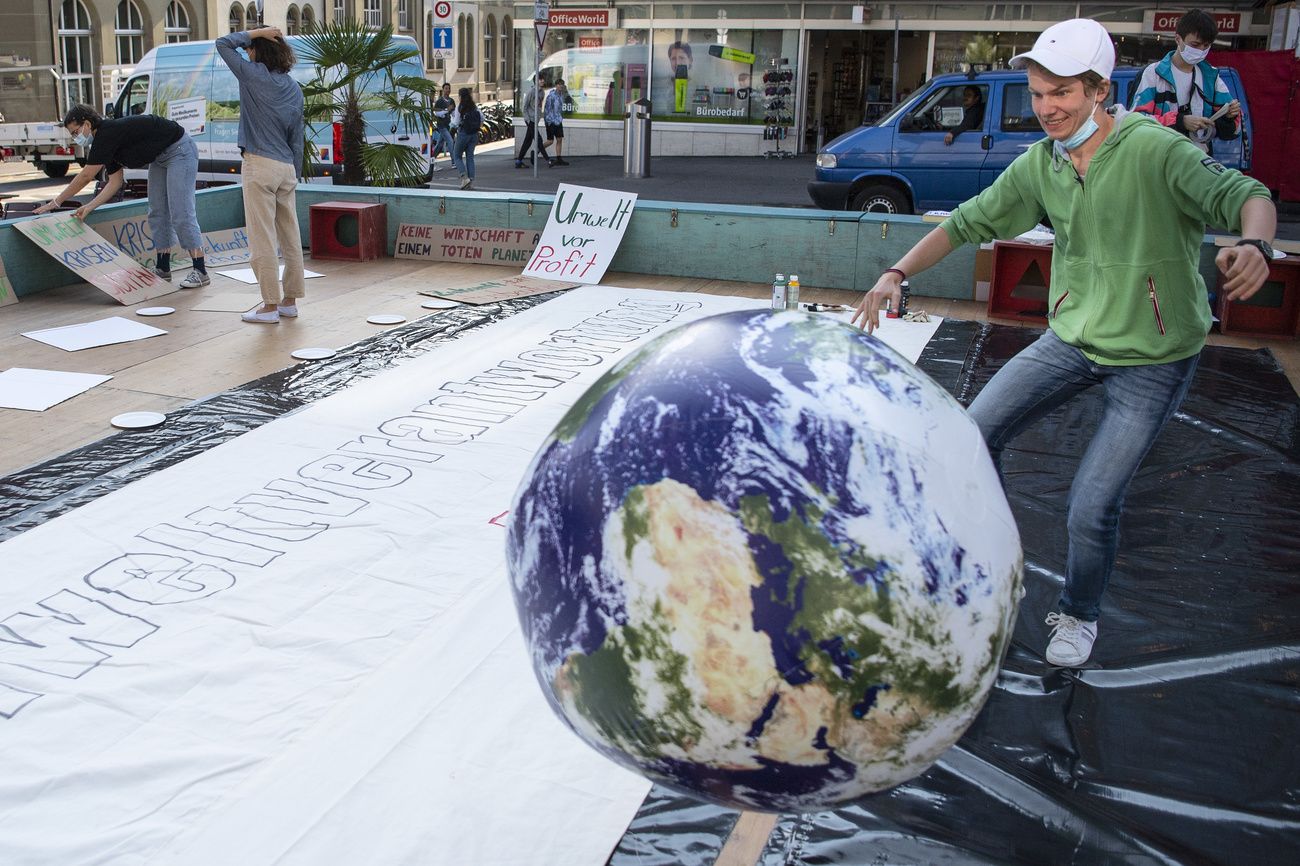
Plus
Initiative for environmental responsibility: essential for the left, unsustainable for the right
This content was published on
Dec 12 2024
The Swiss people vote on February 9 on the popular initiative “for environmental responsibility”.
read more Initiative for environmental responsibility: essential for the left, unsustainable for the right
For the rest of the program, uncertainty reigns. Several popular initiatives have been successful, but Parliament has not yet finished examining them. It is not yet possible to know which ones will be ready to be submitted to citizens for approval. “Everything depends on the progress of parliamentary work,” confirms information officer at the Federal Chancellery Beat Furrer.
However, it is likely that the cash initiativeExternal link be the subject of a popular vote this year. The text launched by the Swiss Freedom Movement, which counts among its members opponents of anti-Covid measures, wants to guarantee that coins or bank notes are always available in sufficient quantities, in order to avoid complete digitalization of the cash.
The people could also be led to take up a theme debated for years, by voting on the initiative of the women of the Radical Liberal Party (PLR / right) entitled “for fair taxes”External link. This requires that married couples no longer be taxed jointly, but individually, so that they do not pay more taxes than single people.
Two more anecdotal subjects could also be ready to go to federal votes: foie gras and fireworks. A popular initiative wants to ban the importation of foie gras and products based on this offal. With this text, the Swiss Animal Alliance wants to ban a product which requires “the force-feeding” of thousands of animals.
Would you like to receive all the useful information during federal voting periods? Subscribe to our newsletter.
Another text plans to ban the sale and use of fireworks. At the origin of this, former journalist Roman Huber argues that firecrackers are synonymous with stress for people sensitive to noise, as well as for animals.
The uncertainty is even greater regarding referendums. For the moment, no signature collection is underway. According to the Federal Chancellery, it is therefore possible that no referendum will be submitted to federal votes in 2025.
To make it easier for Swiss people abroad to participate in the various elections, the OSE intends to continue to support the introduction of electronic voting in the cantons. Currently, e-voting is in the testing phase in three cantons Basel-Stadt, St. Gallen and Thurgau, as well as in a few municipalities. From this perspective, Ariane Rustichelli considers that the validation of electronic identity by Parliament is a step in the right direction.
Text reread and verified by Samuel Jaberg
Learn more
Following
Previous

Plus
“Parliamentarians are on a permanent campaign”
This content was published on
08 nov. 2024
A year after the national elections, are the Federal Chambers still in tune with the people? We discussed it on Let’s Talk.
read more “Parliamentarians are on a permanent campaign”

